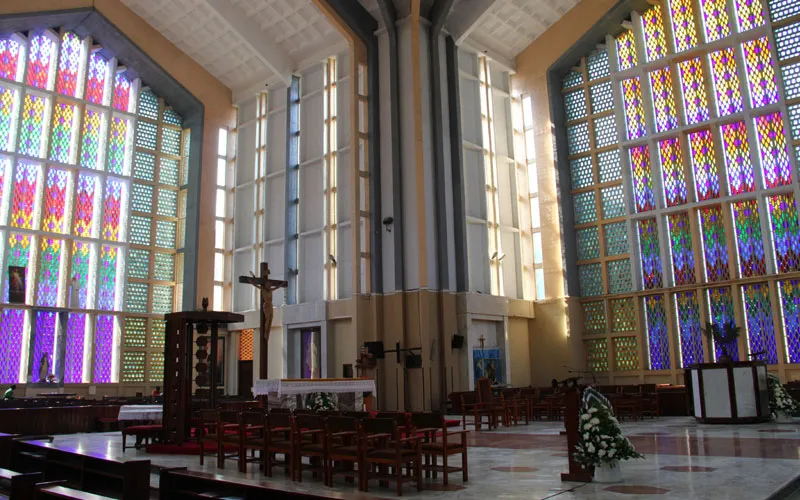The CitizenGo activist says that closure of churches in Kenya has once more cast a dark shadow on worship in the country.
“People don’t know what to do any more. It was a very dull Palm Sunday yesterday,” she says, and adds, sharing her own experience, “Today, I passed by Holy Family Basilica (in Kenya’s capital Nairobi) to try and get some palm branches. I fear that I am missing the experience of the Holy Week and Easter.”
Her sentiments are echoed by the of Linda Vijana Initiative (LVI) founder, Catherine Njore who foresees families losing moral direction with the closure of churches.
“It doesn’t help that families are not praying together. If we all prayed in our families, this closure of churches wouldn’t affect us this much,” Ms. Njore tells ACI Africa in the Monday, March 29 interview.
As for the closure of worship places, the Kenyan-born Pro-Lifer fears that the country is “putting God aside in an attempt to stay safe.”
(Story continues below)
“We can’t afford to put God aside if we wish to win this war,” she says, adding that she is set to go for the way of the cross, whether the churches will be open or not.
“I went on the way of the Cross last year alone. I will do the same this year. I urge families to take personal prayers very seriously as places of worship remain closed,” says Ms. Njore.
Meanwhile, a Minister of the Pentecostal Evangelistic Fellowship of Africa (PEFA) in Nairobi has, in a widely circulated “letter to President Uhuru Kenyatta,” called on Kenya’s Head of State not to “lump” churches together with social joints in the new lockdown.
According to Bishop Peter Ambuko, the Kenyan government has continued to treat the church in the country poorly despite its gains in curbing the spread of COVID-19.
“Since the churches reopened, we have religiously followed guidelines as directed by the Interfaith council for national response to coronavirus pandemic. As a result, we don’t have cases of transmission traced back to churches,” Bishop Ambuko says in the video.
He adds in reference to the March 26 Presidential address, “We as religious leaders were surprised to learn that churches have been lumped together with bars and they have been closed. Mr. President, I believe this is lack of respect for the churches and even more, contempt for the same.”
The PEFA Bishop laments that poor civilians in the country have, for long, endured the suffering that was brought about by the COVID-19 lockdown, a period he says politicians went about to enrich themselves.
“Last years, when this pandemic started, we joined you and endured the lockdown for more than four months because we wanted to fight this virus and eliminate it. We endured job losses, businesses were closed, our livelihoods were taken away from us in the hope that everything would go back to normal,” Bishop Ambuko laments.
He adds, “But as soon as the curve started to flatten, we thought that our lives would resume back to normal. Then you Mr. President and your brother Raila restarted the BBI reggae. And you started together will your followers to crisscross the country in utter disregard to the laid down corona protocols, which your government had put in place.”
He blames the reported rise in COVID-19 infections in the country on politicians who, he says, travelled all over the country in big rallies.
“Let me put it to you plainly, it is these careless actions by you the politicians, that has made the rallies to become the super spreaders of this virus,” the Religious leader says in his video message.
He urges the government to allow public worship, noting that the church has in the past been helpful in government projects such as registration of voters and campaigns for vaccination against a number of ailments in the country.
“Don’t you think that if you do the same with the COVID-19 vaccination and testing, you would yield the same results?” He poses, and adds, “The Church can become your ally or your enemy. The choice is yours. But as things turn out now, you have treated the church with contempt.”
The Prelate further calls on President Kenyatta to desist from misleading voices, saying, “Don’t listen to people who don’t fear God; people who keep inciting you against the Church. Open the churches and let the church help you in the fight against this pandemic.”
Agnes Aineah is a Kenyan journalist with a background in digital and newspaper reporting. She holds a Master of Arts in Digital Journalism from the Aga Khan University, Graduate School of Media and Communications and a Bachelor's Degree in Linguistics, Media and Communications from Kenya's Moi University. Agnes currently serves as a journalist for ACI Africa.








